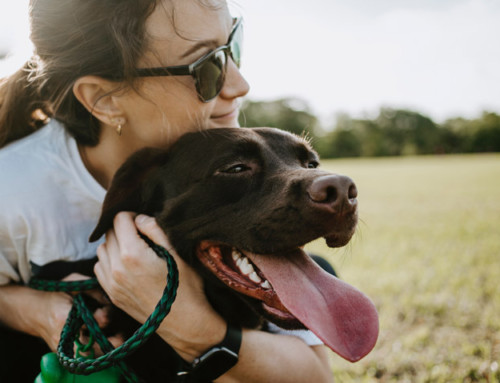Runny eyes or nose, repeated sneezing, excessive thirst, difficulty urinating — these are potential signs your dog is sick.
As a responsible pet parent and loving owner no doubt you’d like to feel confident you’d be able to tell if your dog is sick. After all, knowing the signs to look out for can help ensure you can provide your fur pal with the care he or she needs.
How do I tell if my dog is sick?
Believe it or not, this is quite a common concern amongst pet owners. When you love your dog to bits, you want to feel confident that if your dog became ill you’d notice the warning signs and act appropriately.
However, recognising a dog is sick isn’t always easy; some of the symptoms aren’t completely obvious. As such, picking up on subtle changes in your dog’s personality and behaviour can be the key to assisting with recovery.
Some of the more subtle signs that might indicate your dog is sick include:
- Suddenly urinating or defecating in the home
- Difficulty defecating or urinating
- Loss of appetite
- Weight loss (When this happens over a period of a few weeks it can be harder to notice)
- Increased neediness
- Becoming socially withdrawn
Because you know your precious fur pal better than anyone, you’ll most likely be the person to recognise when something is wrong. Don’t be afraid about over-reacting.
After all, it’s better to take a prompt trip to the vet and find out everything’s okay than ignore the symptoms until they develop into something more serious.
7 common signs your dog is sick
As a pet owner, it’s super important to be aware of your dog’s ‘normal’ behaviour, habits and appearance. Certainly, what’s ‘normal’ for your pooch might be completely abnormal for another dog, but that’s perfectly okay.
However, knowing what’s normal for your dog makes it much easier to recognise when something is off (i.e. your dog is sick).
Here are 7 common signs your four-legged pal may be feeling a little off colour.
1. Changes in behaviour
If Fido suddenly becomes grumpy or aggressive, this could be an indicator he’s feeling unwell or is in pain. This is particularly likely if Fido is usually the sort of dog who loves a snuggle, but all of a sudden snaps at you when you go in for a kiss.
When a dog acts ‘out of sorts’ it’s usually because they are feeling unwell. Taking your dog to the vet is the best way to ensure that if there is a health issue it is treated appropriately and timely.
2. Respiratory symptoms
The odd cough or sneeze is nothing to work yourself up about, but if Fido is constantly coughing, wheezing or seems to be having difficulty breathing, seek veterinary advice.
Don’t forget, some breeds of dog are more prone to respiratory issues, so it may be worthwhile talking to your vet about potential preventative measures you can take.
3. Change in bathroom habits
Sure, it’s a bit grosse to talk about but your dog’s toilet habits can reveal a lot. If your dog’s poop suddenly becomes runny, you notice he’s having difficulty defecating or he’s doing his business where he knows he shouldn’t — get it checked out.
Taking your four-legged friend to the vet will help you to identify the underlying cause. Hopefully, it’ll be something super simple, but if not at least you can have it treated.
4. Signs of a troubled nervous system
While shaking, seizures and stumbling or weakness may be a sign your dog has swallowed something poisonous, there are a few additional signs that may suggest your dog is sick.
If you fur pal becomes disorientated, his head tilts to one side, he circles repetitively or twitches, it’s worthwhile taking a trip to the vet to get him checked out.
5. Tummy issues
Every dog will vomit from time to time. It’s usually because they’ve either gulped their dinner down too fast or they’ve snacked on something they shouldn’t have.
However, if your fur baby has a combination of symptoms, it’s time to take action. For example, if your dog vomits, has diarrhoea and seems lethargic, this could be a sign your dog is sick.
Other signs to watch for include: loss of appetite, dry heaving, bloating and restlessness.
6. Physical changes
If your dog’s once silky coat is now dull or balding, it could be a signal of poor health. Aside from their fur, there are many other physical changes that can suggest the need for treatment. Changes to look for include:
- Skin rash
- Hair loss/balding
- Skin redness (may be accompanied by constant itching or scratching)
- Skin lumps
7. Shows signs of pain
It can be tricky to recognise when your dog is in pain. While some dogs can vocalise their pain (by whimpering, whining or howling, for example), most suffer in silence, which is a sad thought.
Potential signs your dog is sick and in pain include: unusual aggression, swelling, lameness or lethargy, reluctance to move and agitation.
If you do suspect your canine chum is in pain, seek veterinary attention to help get to the bottom of the issue and hopefully source treatment.
As any dog owner would know, your fur pal is part of the family. While your furry friend cannot speak up and tell you he’s unwell, it’s important to keep an eye on him to ensure he stays happy and healthy for as long as possible.
Being aware of the common signs and symptoms that may indicate your dog is sick is important. By recognising the signs early, you can get your dog the care and attention he deserves and hopefully have him on the road to recovery quick as a flash!
Have you recognised that your dog is sick or in pain? What were the signs?
Image source: Unsplash








I appreciate you helping me to understand that stomach problems combined with lethargy can indicate that a dog is sick. My dog has been sleeping a lot these past couple of days and hasn’t been eating too much food. I am hoping that he isn’t too sick, but I will take him to a veterinarian just to be safe.